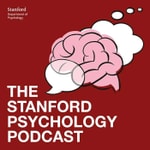Stanford Psychology Podcast – Details, episodes & analysis
Podcast details
Technical and general information from the podcast's RSS feed.

Stanford Psychology Podcast
Stanford Psychology
Frequency: 1 episode/9d. Total Eps: 157

The student-led Stanford Psychology Podcast invites leading psychologists to talk about what’s on their mind lately. Join Eric Neumann, Anjie Cao, Kate Petrova, Bella Fascendini, Joseph Outa and Julia Rathmann-Bloch as they chat with their guests about their latest exciting work. Every week, an episode will bring you new findings from psychological science and how they can be applied to everyday life. The opinions and views expressed in this podcast represent those of the speaker and not necessarily Stanford's. Subscribe at stanfordpsypod.substack.com. Let us hear your thoughts at [email protected]. Follow us on Twitter @StanfordPsyPod. Visit our website https://stanfordpsychologypodcast.com. Soundtrack: Corey Zhou (UCSD). Logo: Sarah Wu (Stanford)
Recent rankings
Latest chart positions across Apple Podcasts and Spotify rankings.
Apple Podcasts
🇨🇦 Canada - socialSciences
28/07/2025#7🇨🇦 Canada - science
28/07/2025#56🇬🇧 Great Britain - socialSciences
28/07/2025#4🇬🇧 Great Britain - science
28/07/2025#31🇩🇪 Germany - socialSciences
28/07/2025#10🇩🇪 Germany - science
28/07/2025#87🇺🇸 USA - socialSciences
28/07/2025#13🇺🇸 USA - science
28/07/2025#53🇫🇷 France - socialSciences
28/07/2025#32🇨🇦 Canada - socialSciences
27/07/2025#9
Spotify
No recent rankings available
Shared links between episodes and podcasts
Links found in episode descriptions and other podcasts that share them.
See all- https://twitter.com/StanfordPsyPod
98 shares
- https://twitter.com/EricNeumannPsy
62 shares
- https://twitter.com/profbohns
18 shares
RSS feed quality and score
Technical evaluation of the podcast's RSS feed quality and structure.
See allScore global : 42%
Publication history
Monthly episode publishing history over the past years.
138 - Hal Hershfield: Connecting with Your Future Self for a Better Tomorrow
jeudi 26 septembre 2024 • Duration 37:47
This week, Enna chats with Dr. Hal Hershfield, Professor of Marketing, Behavioral Decision Making, and Psychology at UCLA Anderson School of Management. In 2017, Hal was recognized as a 40 under 40 best business school professor. This year, he was voted as faculty of the year by MBA students at UCLA.
Hal studies how thinking about time transforms the emotions and alters the judgments and decisions people make. His research concentrates on the psychology of long-term decision making and how time affects people’s lives — specifically at a moment when Americans are living longer and saving less.
Hal earned his PhD at Stanford Psychology under the mentorship of Dr. Laura Carstensen, who is Enna’s PhD advisor currently. In this episode, Hal shares his journey in psychology, talks about his research on time and decision making as well as his recent book, Your Future Self: How to Make Tomorrow Better Today, an insightful and entertaining guide to grow into our ideal selves.
Please join our substack (https://stanfordpsypod.substack.com/) to stay connected with our community of listeners from all over the world! If you found this episode interesting, please consider leaving us a good rating. It just takes a minute but will allow us to reach more listeners to share our love for psychology.
Hal’s website: https://www.halhershfield.com/
Hal’s book: https://www.halhershfield.com/yourfutureself
Hal’s LinkedIn: https://www.linkedin.com/in/hal-hershfield/
Hal’s Twitter: @HalHershfield
Enna’s LinkedIn: https://www.linkedin.com/in/ennayuxuanchen/
Enna’s Twitter: @EnnaYuxuanChen
Podcast Contact: [email protected]
Podcast Twitter: @StanfordPsyPod
137 - Kelsey Lucca: Unpacking the Development of Exploration and Exploitation
vendredi 26 juillet 2024 • Duration 37:24
Anjie chats with Dr. Kelsey Lucca. Kelsey is an Assistant Professor in the Department of Psychology at Arizona State University. She directs the Emerging Minds Lab, where she leads her team to investigate cognitive development during infancy and early childhood, with a focus on the development of curiosity, social cognition, communication, and problem solving. In this episode, Kelsey chats about one of her recent papers “Developmental differences in children and adults’ enforcement of explore versus exploit search strategies in the United States and Turkey”. She also shares her personal journey into developmental science.
Kelsey’s lab website: https://www.emergingmindslab.org/
Kelsey’s Lab twitter: @EmergingMindsAZ
Kelsey’s paper: https://onlinelibrary.wiley.com/doi/abs/10.1111/desc.13520
Anjie’s: website: anjiecao.github.io
Anjie’s Twitter @anjie_cao
Podcast Twitter @StanfordPsyPod
Podcast Substack https://stanfordpsypod.substack.com/
Let us know what you thought of this episode, or of the podcast! :) [email protected]
128 – Halie Olson: How our Brains Care About our Personal Interests
Season 1 · Episode 128
jeudi 14 mars 2024 • Duration 47:01
In this episode, Adani chats with Dr. Halie Olson! Halie is a postdoctoral researcher at MIT’s Department of Brain and Cognitive Sciences. Her research explores how early life experiences and environments impact brain development, particularly in the context of language, and what this means for children’s outcomes.
Halie talks about the intriguing backstory and results of her recent pre-print paper titled “When the Brain Cares: Personal interests amplify engagement of language, self-reference, and reward regions in the brains of children with and without autism.” In particular, she discusses what it means to be really interested in something, and how our brains respond to language about things we’re personally interested in. Halie also shares how she first got involved in research, her favorite parts about science, what she is excited to work on next, and a fun book recommendation!
If you found this episode interesting at all, subscribe to our Substack and consider leaving us a good rating! It just takes a second but will allow us to reach more people and make them excited about psychology.
Halie’s paper: https://doi.org/10.1101%2F2023.03.21.533695
Halie's website: halieolson.com
Adani’s website: adaniabutto.com
Podcast Twitter: @StanfordPsyPod
Podcast Substack: https://stanfordpsypod.substack.com/
Let us know what you thought of this episode or the podcast! :) [email protected]
39 - Robert Rosenthal: Self-Fulfilling Prophecies And The Pygmalion Effect
jeudi 31 mars 2022 • Duration 01:30:17
Eric chats with Robert Rosenthal, Professor of Psychology at University of California Riverside. Bob is the former Edgar Pierce Professor of Psychology at Harvard. Bob has gained worldwide fame for his work on self-fulfilling prophecies: “When we expect certain behaviors of others, we are likely to act in ways that make the expected behavior more likely to occur.”
Over 50 years ago, Bob introduced the Pygmalion Effect many psychology students now read about in their textbooks: when teachers expect certain students to be smart, those students actually become smarter. In this episode, Eric asks Bob about the current state of the evidence around the Pygmalion Effect. Bob discloses that he only started his work on self-fulfilling prophecies because of accidental analyses in his work. Bob relates his work to growth mindsets and speculates about self-fulfilling prophecies when judging another’s moral character.
He also discusses what is now called the Rosenthal Effect: experimenters’ expectations of their studies can influence the actual study outcomes. What methodological and statistical advances in psychology is he excited about? What does he think of the current reproducibility crisis? Are we misunderstanding meta-analyses? Finally, Bob shares advice for young scientists and ends with a forceful appeal to the beauty and privilege of learning about psychology.
If you found this episode interesting at all, consider leaving us a good rating! It just takes a second but will allow us to reach more people and make them excited about psychology.
Links:
One of Bob's papers on the Pygmalion Effect
Eric's website
Eric's Twitter @EricNeumannPsy
Podcast Twitter @StanfordPsyPod
Let us know what you thought of this episode, or of the podcast! :) [email protected]
38 - Angie Johnston: How Studying Dogs (!) Helps Us Understand Human Social Learning
jeudi 24 mars 2022 • Duration 44:58
In this episode, Anjie chats with Dr. Angie Johnston, who is currently an assistant professor of psychology at Boston College, where she directs the Canine Cognition Center and Social Learning Laboratory. Her works take a comparative approach: comparing human learning to domestic dogs’ learning, as a way to examine which aspects of human learning are unique and which are shared among species. In this episode, we are going to talk about one of her recent works that try to answer a question that many dog owners may have: why does my dog sometimes look back at me?
You can check out the paper we discuss here: Johnston, A. M., Chang, L. W., Wharton, K., & Santos, L. R. (2021). Dogs (Canis familiaris) prioritize independent exploration over looking back. Journal of Comparative Psychology, 135(3), 370.
To learn more about Angie’s research, you can visit her personal website and her lab’s website. She is also on Twitter as @AngieMJohnston
--
We are currently conducting a survey to get to know our listeners better and to collect any feedback and suggestions so we could improve our shows. If you have 1 minute or so, please click the link here to submit your response: https://forms.gle/dzHqnWTptW8pSVwMA. All responses will be anonymous!
37 - Molly Crockett: Moral Outrage, Trust During Covid, And Incentives in Academia
jeudi 17 mars 2022 • Duration 54:52
Eric chats with Molly Crockett, Associate Professor of Psychology at Yale University. Molly studies how people make moral decisions, both in the lab and in everyday life. Their lab’s research has won numerous awards around the world, and Molly will be moving their lab to Princeton University in summer 2022.
In this wide-ranging conversation, Molly first chats about their recent work on social media. Are online platforms making us more outraged? How should we reshape social media for a more civil society? Then, Molly discusses another line of work on trust in leaders around the globe during Covid. Do people like or dislike utilitarian leaders? What was Molly's rather adventurous experience running a registered report proposing data collection across six continents? Finally, Molly chats about academic life more broadly. Should we favor slow over fast science? Are current academic incentives damaging to our mental health?
If you found this episode interesting at all, consider leaving us a good rating! It just takes a second but will allow us to reach more people and make them excited about psychology.
Links:
Paper on social media and outrage
Paper on trust in leaders during Covid
Molly's Twitter @mollycrockett
Eric's website
Eric's Twitter @EricNeumannPsy
Podcast Twitter @StanfordPsyPod
Let us know what you thought of this episode, or of the podcast! :) [email protected]
36 - Gillian Sandstrom: Talking to Strangers
jeudi 10 mars 2022 • Duration 47:18
Kate chats with Gillian Sandstrom, a Senior Lecturer in the Psychology of Kindness at the University of Sussex and the Director of the Sussex Centre for Research on Kindness. Gillian’s work focuses on the benefits of minimal social interactions with “weak ties” and strangers, and the barriers that prevent people from connecting with others. In this episode, Gillian tells Kate about the misconceptions that prevent people from talking to strangers and the surprising benefits that can come from engaging in fleeting interactions with strangers, even if we will never see them again.
Check out Gillian’s paper, Why do people avoid talking to strangers? A mini meta-analysis of predicted fears and actual experiences talking to a stranger, which received an Honorable Mention in the Journal of Self and Identity’s 2021 Best Paper Award, here.
You can learn more about Gillian’s exciting research on her website: gilliansandstrom.com. You can also connect with her directly on Twitter @GillianSocial.
--
We are currently conducting a survey to get to know our listeners better and to collect any feedback and suggestions so we could improve our shows. If you have 1 minute or so, please click the link here to submit your response: https://forms.gle/dzHqnWTptW8pSVwMA. All responses will be anonymous!
35 - Diego Gambetta: Trust, Distrust, and Cynicism
jeudi 3 mars 2022 • Duration 55:07
Eric chats with Diego Gambetta, social scientist and Carlo Alberto Chair at the University of Turin. Diego has studied topics as diverse as trust, the mafia, and violent extremism. His work has been widely cited around the world. Diego has held past appointments at numerous universities such as Oxford, Cambridge, Columbia, and Stanford.
In this episode, Eric and Diego chat about trust, distrust, and cynicism. Diego explains what it means to trust someone, and how distrust is more complex than a mere absence of trust. Whom do we trust and why? Can we trust our instincts? Is trust always desirable? Does everyone want to be seen as a trustworthy person? How does the Mafia manage to cooperate despite its distrustful outlook? Finally, Diego responds to Eric’s research ideas on cynicism. How to build trust among the most cynical? Are some people just hopelessly distrustful?
If you found this episode interesting at all, consider leaving us a good rating! It just takes a second but will allow us to reach more people and make them excited about psychology.
Links:
Book Codes of the Underworld
Paper on trust
Eric's website
Eric's Twitter @EricNeumannPsy
Podcast Twitter @StanfordPsyPod
Let us know what you thought of this episode, or of the podcast! :) [email protected]
34 - Fiery Cushman: The Possibility of Violence
jeudi 24 février 2022 • Duration 47:06
Joseph Outa chats with Professor Fiery Cushman, professor of psychology at Harvard University. Fiery directs the Moral Psychology Research Lab where he investigates how people make decisions in social contexts; he focuses on questions like why and how did punishment evolve, what are the emotional systems that prevent us from doing harm, and how do humans make sense of each other’s behaviors. He received his BA and PhD from Harvard University and has been bestowed with various awards and fellowships including the APA Distinguished Award for Early Career Contributions, the Stanton Prize from the Society of Philosophy and Psychology, just to name a few. He has written over 50 journal articles and is published in prestigious journals like Cognition, Psychological Science and the Proceedings of National Academy of Sciences (PNAS), and his research has been continuously funded by organizations such as NSF, the Templeton Foundation and the Office of Naval Research.
In this episode, Joseph and Fiery talk about an unpublished manuscript titled "The Possibility of Violence" which examines how our morals constrain the possibilities we consider when making decisions, as well as a case study of a violence-reduction program in the Chicago Public School system.
33 - Jon Jachimowicz: Should You Follow Your Passion?
jeudi 17 février 2022 • Duration 01:07:02
Eric chats with Jon Jachimowicz, Assistant Professor of Organizational Behavior at Harvard Business School. Jon studies people’s passion for work, specifically how people can pursue, fall out of, and maintain their passion over time. He also studies how people perceive inequality. Jon has won numerous academic awards and was listed as a Poets & Quants 40 under 40 honoree and Forbes 30 under 30.
In this episode, Eric and Jon chat about passion narratives at work and in life more generally. Jon discusses his new, not-yet-published research on how passion one day can lead to more work on that day but cause exhaustion the next day. Jon argues that people do not have a fixed level of passion and that the link between passion and productivity is more complex than we might think. He then discusses how to maintain passion in the long run, at work and outside of work. Should we even pursue our passions? What does it mean to engage in “passion shaming”? How can passion narratives lead to more inequality? Do passion narratives vary across the world?
If you found this episode interesting at all, consider leaving us a good rating! It just takes a second but will allow us to reach more people and make them excited about psychology.
Links:
Jon's website
Jon's Twitter @jonj
Eric's website
Eric's Twitter @EricNeumannPsy
Podcast Twitter @StanfordPsyPod
Let us know what you thought of this episode, or of the podcast! :) [email protected]









